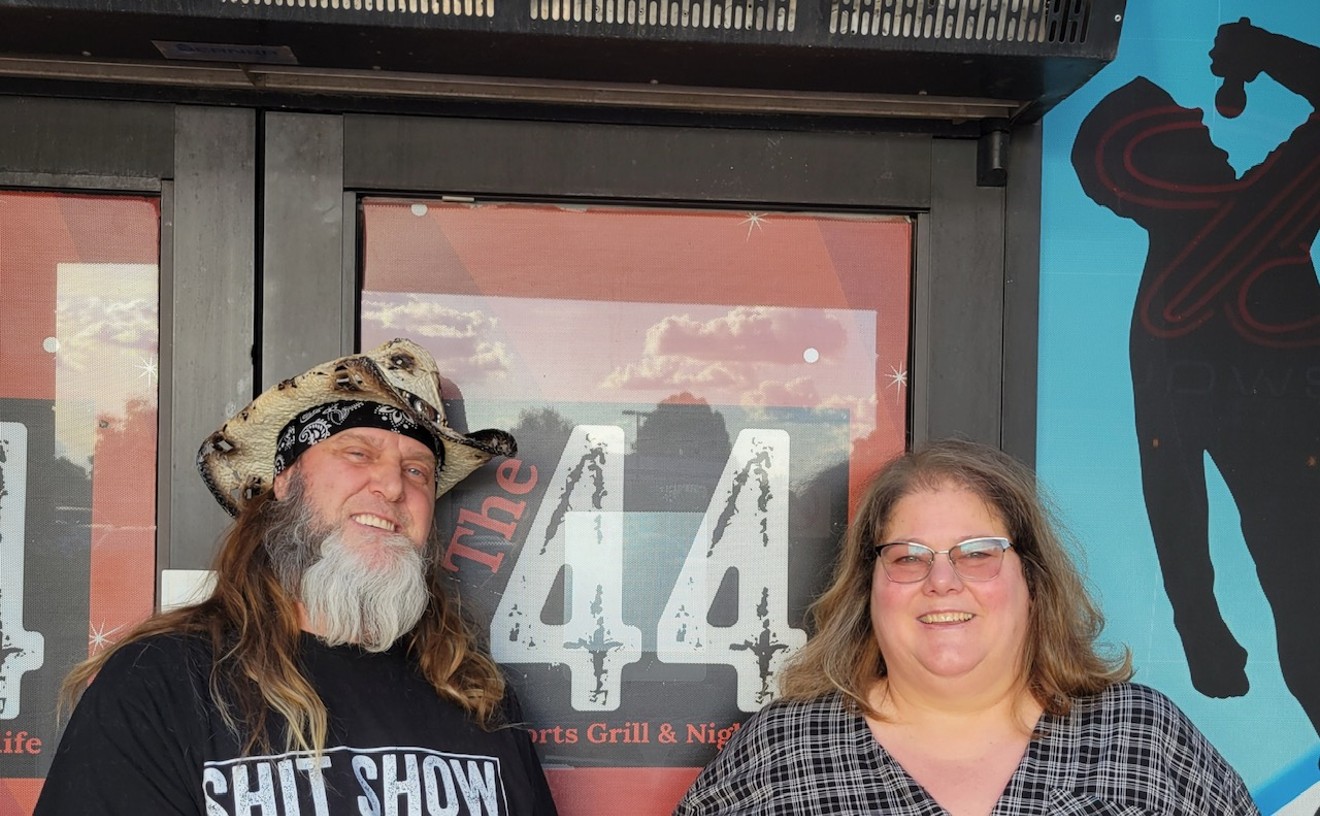Forget that their debut record sold two million copies. Forget the travesty of Mariah Carey beating them out of the Grammy for Best New Act. Forget even that this band's "It's only rock 'n' roll" attitude and catchy songwriting make it a meaty musical antidote to the weak, Axl Rose ain't-I-a-star? histrionics that are the point of most of today's Deep Purple derivatives.
The juiciest Black Crowes story, the one that made the cover of Rolling Stone last month, is how they were dumped from the recent ZZ Top tour. The dispute began when Bill Ham, ZZ Top's manager and director of that band's Lone Wolf Productions, and officials from the tour's co-sponsor Miller Lite formed a tight-assed cabal and tried to limit what the Crowes could say onstage. After repeatedly warning the group about banter that was supposedly bad for business, Ham and Miller Lite unceremoniously kicked the unruly boids off the band's first major-arena tour. Worst of all, the end came in the middle of a three-night stand in the Crowes' hometown of Atlanta. But the Crowes' getting booted off the tour is more than the familiar tale of how a collection of immature, overinflated rock 'n' roll egos blew it for themselves. What happened on the ZZ Top tour has shed overdue light on a new rock phenomenon: corporate sponsorship of rock 'n' roll and what the gray suits want for their money. "It started out with small things," says Crowes drummer Steve Gorman in a recent interview. "Like, the word came down that we weren't allowed to take any non-Miller products out of the dressing room. Okay, I can pour my beer in a cup."
As the tour rolled on, however, the relationship between the Crowes, Miller Lite, and Ham got worse. The band's vocalist and semicivilized mass of kinetic energy, Chris Robinson, exacerbated the situation with a nightly stage monologue extolling the virtues of live rock 'n' roll versus videos sandwiched between commercials. Just the mention of the word "commercials" made Miller Lite twitch. The company asked Robinson to stop.
Blessed with Zorro's taste in clothes, a gloriously tight butt and the kind of shoot-from-the-lip style that helped land James Brown in the joint, Robinson continued his nightly spiel. By the time the tour reached Atlanta, Miller Lite's yeasty paranoia was bubbling over. After the second show at the Omni, Miller Lite and Ham dumped the Crowes.
"Chris wasn't taking a shot at Miller," explains Gorman. "He was talking about us as a band, and the fact that all we can control about this business is our own music. We find the whole thing ironic because initially, we didn't even think about Miller and corporate rock, and now we're symbols of its dark side. Now that it's happened and people are talking, we hope everyone will be aware of what it means to take their money."
Speaking of dark sides, the real question about the Crowes' rude expulsion from this tour is how the members of ZZ Top fit in. How much influence over this decision did Billy Gibbons and company have? And did the members of ZZ Top breathe a sigh of relief when this ambitious young band disappeared and less-ambitious alternatives like Hall Aflame and John Mayall came aboard to finish out the tour? In other words, were the Crowes blowing the tres hombres off the stage? "We were either kicking their ass or boring the crowd to death, depending on your tastes," Gorman says. Fronted by the talented Robinson brothers, Chris and guitarist Rich, the band also includes Gorman, guitarist Jeff Cease and bassist Johnny Colt. "I mean, we don't have cranes in our show. They have cranes, booms, curtains, effects--a big, staged production. Meanwhile we just go out and let 'er rip. "Now, if they played today the way they did fifteen years ago, it would have been a run for the money every night." Getting thrown off the tour hasn't broken the Crowes' hearts. They were too good to play second fiddle to ZZ Top, and are now where they belonged in the first place, headlining a tour. Besides, getting in trouble with Miller Lite gives them the kind of rock 'n' roll outlaw image that sells tickets and pumps up the ego.
Gorman also suggests that the Crowes and ZZ Top, a match that looked like a natural on paper, didn't work onstage. Like ZZ Top, the Crowes is a latter-day sprout of rock 'n' roll with a commitment to its roots. But the band's mentors come from a different generation than those of that little ol' band from Texas. For ZZ Top, "roots" means T-Bone Walker and Muddy Waters. By contrast, the Crowes' roots are all touchstones of Seventies protometal guitar rock: Faces, Aerosmith, Deep Purple, Humble Pie, and the Rolling Stones. The generation gap proved too much of a clash. The Black Crowes' debut record Shake Your Moneymaker (Def American) is a tough, what-you- see-is-what-you-get collection of power-chord and blues-riff rock that steamrolls you like the second coming of Machine Head.
But like Boston, Foreigner and a handful of others before them, Black Crowes is a band cursed and blessed by a smash first album. It made the members stars, but set them up for the sophomore jinx. To head off the second-record jitters, Gorman says the band has "seven or eight" new tunes finished and ready. Most of them are part of the current live set.
But even after the future sets in, Shake Your Moneymaker will remain that rare record that has it both ways: a style rooted in the past that sounds new, a rephrasing of Seventies rock that never copycats. Chris Robinson's impassioned vocals recall Bad Company's Paul Rodgers--or, by Robinson's own admission, the late Steve Marriott--but still manage to carve out their own distinctive niche. Tear off the cover photograph and Shake Your Moneymaker could be a lost Stones masterpiece from the mid-Seventies. Keithisms on the guitar are everywhere and the band has obviously spent a lot of time absorbing the Jagger-Richards songbook. Tunes like "Sister Luck" sound like outtakes from Exile on Main Street. Onstage, the band even comes on like the Stones--deliberate, loud, subtle as a backhoe. But after listening to the record and seeing them live, you begin to sense something else lurking in the Crowes' musical past. Although it looks like the average big-venue rock band--white men in boots, jewelry, long dark locks and tight pants that tie in the front--there are also touches like string ties and planter's hats that tell you that this is not your average bunch of L.A. poseurs or second-generation Rust Belt Kiss fans.
Their animosity toward hair spray and spandex is what tips it. The Crowes are from the South. It's a Southern band. The members grew up listening to Southern rock, electric boogie and blues, "Sweet Home Alabama," Live at the Fillmore East, and Toy Caldwell wailing away on "Can't You See." Although their own music ended up sounding more like Aerosmith than the Allman Brothers, the Crowes did get their love of the blues and their honest approach to music from Southern rock. Being able to play "Free Bird" also kept them working in the beginning. The Crowes matured as a band in Chattanooga and Atlanta, and had to learn to cover Southern-rock standards to keep the natives from getting restless. Booed for playing Aerosmith's "No More, No More," the band would quickly quiet things down with a convincing "Midnight Rider." These days, the Crowes still find that keeping an Allmans cover around can be a useful precaution. "Lately, we've been using `Dreams' as a sound check," Gorman says. "One night at this big outdoor music festival in Memphis, Gregg Allman came back and asked us if we wanted to jam on an encore. He said he heard we did `Dreams.' We all looked at each other like, `Holy shit,'" he says with the kind of hero-worship only hungry young bands can have. "We ripped through our stuff like, `Hurry up, let's get this shit out of the way, let's get to the encore.'"
Southern rock has nothing to do with rednecks, Gorman is quick to point out. Both the Allmans and Lynyrd Skynyrd based their music on the South's rich black musical heritage, and the Crowes have continued on that path. Their album takes its name from Elmore James' blues classic. And Otis Redding's "Hard to Handle" is the album's only cover.
Black men have also been featured in the band's what's-wrong-with-this-picture? videos. In the video of "Hard to Handle," for example, the sight of young black men dancing while Robinson lip-synchs and mugs for the camera is jarring.
The Crowes' loose, take-it-as-it-comes view of life explains why the song "Thick n' Thin" opens with a noise that sounds like your average big-city garbage worker on the job. Metal crashes against metal.
Turns out this impromptu percussion involved Gorman and his ex-car, that legend in the annals of the American auto industry, the ragged but real 1973 Dodge Dart.
"The Dart was given to me by someone I didn't even know. He was moving from Atlanta to New York and didn't want it," says Gorman. "I had just met this guy and he knew a friend of a friend of mine and all of sudden he said, `Hey, do you have a car?' Before I could say, `Okay,' he said, `Here's the address, here are the keys, go get it.'
"That car was designed to run into shit. It had these two big rubber things sticking out from the bumper. I had been driving it a few weeks before I realized, `Hey, that front bumper is happening.' I ran into a dumpster at a restaurant in Atlanta just to test it. Later, while we were recording the first record, I was driving that thing to the studio every day and one afternoon I saw this dumpster outside the building. When I hit it, there were all these pipes inside and they made this incredible sound. Someone said we should see what that sounds like on tape. The next thing you know we had a mic out there and I was plowing into the dumpster over and over. It sounded so good that we decided to put it on the record. "We actually did eight takes. The one we used isn't the best, but it's the only one where everyone isn't laughing hysterically. I guess it's one of those rare instances where we converted studio boredom into something useful."
Black Crowes will perform at Mesa Amphitheatre on Wednesday, June 12. Showtime is 7:30 p.m.









